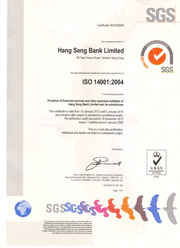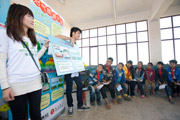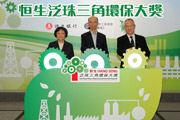
| Corporate Responsibility Report 2012 |
| Our Report | |
| Chief Executive's Message | |
| Our Values | |
| Our Business | |
| Our Commitment Performance |
|
| Our Commitment Corporate Governance |
|
| Our Commitment Customers |
|
| Our Commitment Suppliers |
|
| Our Commitment Staff |
|
| Our Commitment Environment |
|
| Our Commitment Community |
|
| Additional information | |
As one of Hong Kong’s largest listed companies, we have a prominent platform from which to champion the cause of improved environmental stewardship. The collective global response to challenges such as climate change and conserving biodiversity will influence the long-term health of the natural systems upon which we all depend. We are committed to playing our part in working towards positive long-term outcomes.
We take steps to cut our waste production and consumption of energy and natural resources, and encourage our customers and suppliers to do the same through our services and policies. We empower our staff to act as ambassadors for the environment by raising their awareness and understanding of green issues. Whenever possible, our operations utilise environmentally friendly products and certified materials.
We consider the environmental impact of our business travel policies and are working to reduce non-essential travel through increased use of alternatives such as teleconferencing.
As a leading corporate citizen in Hong Kong, we are proud to be a local pioneer in promoting greater environmental responsibility. Beginning with our headquarters building in 2005, we have led the way in gaining ISO 14001 certification among local banks. In 2011, we became the first local bank to achieve this internationally recognised environmental accreditation for all Hong Kong offices and branches.
Since 2007, we have worked with The Conservancy Association through the Hang Seng Yunnan Biogas Project to bring a free and stable energy supply to people living in rural areas in Yunnan province in mainland China. To date, we have helped establish 2,200 biogas facilities that are improving life for 9,000 villagers while saving 15,000 acres of forest every year (equivalent to an area about 95 times the size of Hong Kong’s Victoria Park) and reducing annual carbon dioxide emissions by 25,500 tonnes. In November, a team of Bank volunteers visited Yunnan to inspect the 550 facilities constructed in 2012. We have committed to build a further 800 facilities in 2013, benefiting about 3,000 people.
| Hang Seng Yunnan Biogas Project | Ken So, Chief Executive of The Conservancy Association
“We would like to thank Hang Seng Bank for their continuous support in the past six years. The Project is a good demonstration of the effectiveness of collaborative sustainable development efforts by corporations, green groups and local communities.? |
Our involvement with this renewable energy project led to a Gold Award for community relations at the 10th China Golden Awards for Excellence in Public Relations organised by the China International Public Relations Association.
Launched jointly with the Federation of Hong Kong Industries in 2007, the Hang Seng Pearl River Delta Environmental Awards (Awards) are part of our commitment to working with the southern China business community on environmental issues. By recognising the green initiatives of participants, the Awards are helping to accelerate the pace of positive environmental change among manufacturing companies in the Pearl River Delta region.
A record 188 participants submitted 672 projects in 2011/12, with collective achievements including cutting electricity consumption by over 91 million kWh – equivalent to the electricity used annually by 14,000 average four-member households – and reducing waste by more than 650,000 tonnes.
In light of the Awards’ success and to encourage more companies to improve their environmental performance, the 2012/13 Awards will expand to cover the pan Pearl River Delta region.
Other initiatives to promote the reduced consumption of natural resources include our e-Statement and e-InvestAdvice services, through which e-Banking clients can choose to receive account statements and other notices in electronic rather than paper format. By the end of 2012, the number of e-Statement and e-InvestAdvice subscribers had reached over 646,000 and more than 62,000 respectively – collectively saving over 31 million sheets of paper a year. Our printed materials are produced using environmentally certified paper whenever possible – including our interim and annual financial reports, which are printed on Forest Stewardship Council-certified paper. Electronic versions of financial reports are available on our website and shareholders can opt out of receiving a paper version.
Our Green Banking Integrated Account is specially designed to encourage full-time tertiary students at local universities and tertiary institutions to support environmental protection. It offers a wide range of paperless and environmentally friendly banking services.
The Hang Seng Green Financing Scheme provides funding for Hong Kong-owned factories in the Pearl River Delta region to acquire green equipment that will enhance energy efficiency and reduce pollution. (For more details see Facilitating Positive Change in the ‘Our Commitment: Corporate Governance’ section of this Report.)
We reach out to the wider community in partnership with green groups through our support for events such as Friends of the Earth (HK)’s ‘Power Smart’ Energy Saving Contest and the Hang Seng Green Carnival co-organised with The Conservancy Association.
We continue to take steps to support the conservation of biodiversity – both through our financing policies and within our own operations. We stopped serving shark’s fin at Bank functions in 2003 and have since removed endangered reef fish from our menus. We comply with WWF Hong Kong’s Seafood Guide and, in 2011, implemented a sustainable seafood menu endorsed by the same organisation at our banquet hall.
We are making steady progress in cutting our emissions (see table: Environmental Performance) and continue to take steps to stay abreast of environment-related regulatory developments that could directly or indirectly impact our business.
Environmental Performance
| Unit | 2012 ^ | 2011 # | |
|---|---|---|---|
| GHG Emissions (CO2 equivalent)* | |||
| Electricity | tonnes | 24,324.76 | 23,454.59 |
| Employee travel | tonnes | 274.32 | 277.81 |
| Other fuel sources (gas and diesel) | tonnes | 17.51 | 20.93 |
| Total | tonnes | 24,616.59 | 23,753.33 |
| Resources Consumption | |||
| Electricity | Gj | 131,804.29 | 130,405.06 |
| Other Fuel Sources (gas and diesel) | Gj | 1,204.89 | 1,475.42 |
| - Gas | Gj | 26.35 | 26.35 |
| - Diesel | Gj | 1,178.54 | 1,449.07 |
| Water | 000 m3 | 65.90 | 68.22 |
| Paper+ | tonnes | 1,926.89 | 1,797.88 |
| - Compliant | % | 90.71 | 90.02 |
| - Near-compliant | % | 0.98 | 0.17 |
| - Non-compliant | % | 8.31 | 9.81 |
| Waste Disposed to Landfill | |||
| Confidential Waste (non-paper) | tonnes | - | - |
| General Office Waste | tonnes | 279.04 | 358.60 |
| IT and Electrical | tonnes | 0.07 | 0.05 |
| Total | tonnes | 279.11 | 358.66 |
| Waste Collected for Recycling | |||
| Cans | tonnes | 0.19 | 0.19 |
| Confidential (non-paper) | tonnes | 1.33 | 3.47 |
| General Office | tonnes | 51.93 | 46.20 |
| IT and Electrical | tonnes | 54.94 | 70.52 |
| Mixed Paper and Cardboard | tonnes | 668.25 | 791.26 |
| Plastic | tonnes | 0.58 | 0.71 |
| Total | tonnes | 777.23 | 912.35 |
Data coverage: Hang Seng Bank's Hong Kong operations. Data has been rounded up to 2 decimal places.
| Key: m3: | Cubic metres | CO2: | Carbon dioxide | Gj: | Gigajoules |
| |
||







